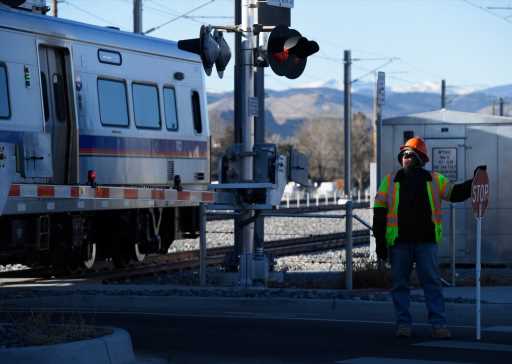Judge rules for RTD on $100M-plus claim by rail project partner
A Denver judge ruled Friday that the Regional Transportation District is not responsible for covering more than $100 million in costs stemming from crossing-gate problems that plagued three commuter rail lines.
The ruling was issued by Judge Andrew P. McCallin more than two years after he presided over a complex, four-week civil trial in Denver District Court. His decision, establishing findings of fact and legal conclusions, serves as the trial verdict.
Denver Transit Partners, the contracting team that built RTD’s A-, B- and G-lines as part of the $2.2 billion Eagle P3 project, had contended in a 2018 lawsuit against RTD that the problems and delays resulting from tricky crossing-gate technology were unforeseen and should be reimbursed by the transit agency. Most recently, DTP claimed nearly $112 million in damages.
Its claims were based in part on what it contended were unforeseen difficulties in winning state and federal regulatory approval.
“The Court concludes that the design and operation of the warning system were under the control of DTP,” the judge wrote in rejecting one of the contracting team’s claims. “Therefore, it is appropriate to place the regulatory risk on DTP for a warning system that fails to activate properly or as designed.”
RTD countersued for $27 million damages, citing missed deadlines and DTP’s failures to meet project requirements. RTD also sought a ruling finding that the contracting team was in default of its partnership contract, allowing the decades-long deal to be terminated.
The judge declined to grant such a ruling or award RTD any damages, either.
“The warning system has been approved” by regulators, McCallin wrote. “It is operating properly and carrying passengers on a daily basis throughout the Denver metro area. … It would be unfair to allow RTD to walk away from all of this now.”
Both sides could appeal aspects of the judge’s ruling. A Denver Transit Partners leader said in a statement that the team was evaluating its options.
“Despite the commercial disputes giving rise to the court’s decision, we have always enjoyed a strong working relationship with RTD, and we expect that to continue,” said Doug Allen, the CEO and executive project director. “Our focus has always been, and remains, delivering a high-quality transit experience for RTD and Denver-area commuters.”
RTD had not yet returned a request for comment.
DTP built three commuter rail lines that terminate at Union Station: the A-Line to Denver International Airport, the B-Line to Westminster and the G-Line to Arvada and Wheat Ridge. It’s also responsible for operating them under a public-private partnership agreement with RTD.
The trial began Sept. 21, 2020, and wrapped up with closing arguments in mid-October 2020. Because there was no jury, McCallin had no deadline to issue a ruling. The parties’ final written pleadings were filed in December 2020.
New wireless crossing-gate technology was at the root of RTD and Denver Transit Partners’ struggles to open the commuter rail lines on time. Gates were supposed to close about 30 seconds before a train came through.
But during testing, they often closed minutes in advance — or cut it too close.
The difficulty of dialing in the technology caused delays in regulatory approval from the Federal Railroad Administration and Colorado’s Public Utilities Commission. For more than two years, flaggers monitored active rail crossings on the A- and B-lines, while the G-Line’s opening was delayed from late 2016 to April 2019.
The 2020 trial centered on regulatory decisions and how those should be viewed in light of contractual provisions that assigned responsibility to the contractors and RTD for different kinds of unforeseen costs.
Read the Denver District Court ruling:
Get more Colorado news by signing up for our Mile High Roundup email newsletter.
Source: Read Full Article




